The Empire of the Wolf Revisited: The Swan Deep Dive
When The Justice of Kings, the first volume in Richard Swan’s “Empire of the Wolf” trilogy, was first announced in the heady (specifically, masky) pandemic era of 2021, it sent a thrill throughout the fantasy reading world. On the one hand, it felt a little counter-cyclical, coming at a time when the fantasy publishing world was exploring new non-European milieus. But this seemed no run-of-your-mill medieval fantasy, for two main reasons.
First, it promised to be a legal fantasy. Politics in fantasy? De rigueur. But one focused around jurisprudence? Interesting. The cover for The Justice of Kings declared “no man is above the law”—a statement that would turn out to be as mischievously misleading as a doctor with a six-inch syringe promising “this won’t hurt a bit”. But it showed that this would be a series where the law was itself a character. For we were concerned with the Sovan Empire, an empire that a short generation ago had conquered most of the surrounding continent and its sovereign nations in a bloody series of battles. Rather than the usual Anglocentric medieval focus, the Sovans are inspired by real Central European history—Prussians, Teutons, the Holy Roman Empire, as well as Slavic influences. But its most unique feature is its extremely advanced legal model, a common law system where everyone is supposed to be equal (including, in many respects at least, women) and that is so modern in some ways that it puts the Victorians to shame. Though the main plot of the series concerns a dangerous plot from within the Empire—involving a mix of religious extremists and political enemies who wish to take over, and whether the Empire will survive this—the theme of the series could well be argued to be whether this proud legal system can survive extreme challenges to its ideals, and, perhaps, whether it was ever ideal in the first place.
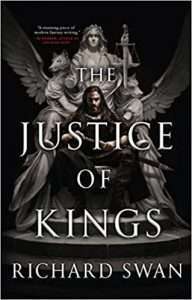 As for the second reason people were excited about Swan’s debut? Well that’s also obvious from the front cover of The Justice of Kings, which depicts, thanks to the excellent cover art of Martina Fačková, the series principal protagonist, Sir Konrad Vonvalt, the Emperor’s Justice: a policeman, lawyer, and magician rolled into one, or in other words a magic-using Judge Dredd, empowered to be judge, jury, and executioner. On that cover he looks ominous, awe-inspiring, unimpeachable, a sword in his lap sat in front of a statute of the scales of justice; the law and the force to use it all in one. As the trilogy goes on we as readers are forced to question this initial impression, and it’s this great character study, along with the legal questions I mentioned earlier, that, I would suggest, have given the Empire of the Wolf a strong critical legacy, and one of enormous popularity, ensuring a follow-up trilogy in the same world set two hundred years later and, from the very people in whose august magazine these words appear, a prequel novella The Scour. It’s also bloody good fun and rather well written, which helps I suppose.
As for the second reason people were excited about Swan’s debut? Well that’s also obvious from the front cover of The Justice of Kings, which depicts, thanks to the excellent cover art of Martina Fačková, the series principal protagonist, Sir Konrad Vonvalt, the Emperor’s Justice: a policeman, lawyer, and magician rolled into one, or in other words a magic-using Judge Dredd, empowered to be judge, jury, and executioner. On that cover he looks ominous, awe-inspiring, unimpeachable, a sword in his lap sat in front of a statute of the scales of justice; the law and the force to use it all in one. As the trilogy goes on we as readers are forced to question this initial impression, and it’s this great character study, along with the legal questions I mentioned earlier, that, I would suggest, have given the Empire of the Wolf a strong critical legacy, and one of enormous popularity, ensuring a follow-up trilogy in the same world set two hundred years later and, from the very people in whose august magazine these words appear, a prequel novella The Scour. It’s also bloody good fun and rather well written, which helps I suppose.
In this unapologetically nerdy article, I examine, in a non-spoiler fashion for those new to the Swanverse (well non-spoiler of plot at least), some of the key themes of the original trilogy, keeping the focus on things which readers new and old to the series will see pop up in The Scour. As you will see, if there is a legacy of this first trilogy, it is, perhaps, that you can talk about it for fucking ages.
Sir Konrad Vonvalt: The Man, The Myth, The Legend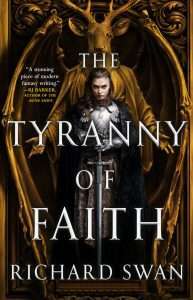 The best place to begin when examining why the Emperor’s Justice and man most likely more handsome than you has already entered the fantasy hall of fame is to look at Swan’s stated influences for the character. First there’s Shardlake, the Tudor lawyer from C J Sansom’s historical mystery series. Like Shardlake, Vonvalt, at least our first impressions of him, is an honest, incorruptible pursuer of justice, and a clever investigator. He’s also, like another stated influence Ned Stark, one of the best swordsmen in the land, and Vonvalt’s naivety can be seen in Book 2 of the trilogy (The Tyranny of Faith) when, just like Ned in King’s Landing, Vonvalt arrives in the Sovan capital unprepared for the nest of vipers he finds. Then there’s Geralt of Rivia, better known as The Witcher. Just like Geralt, Vonvalt is in possession of some terrifying magical powers; specifically, he can command a person to tell the truth, with frequently deleterious effects on their health. And he can communicate with the dead, which leads to some deleterious effects on everyone’s health. And, just like Geralt, Vonvalt is a bit of a lady’s man, his justice in the streets, as we see in The Scour, not precluding him from some justice in the sheets, too.
The best place to begin when examining why the Emperor’s Justice and man most likely more handsome than you has already entered the fantasy hall of fame is to look at Swan’s stated influences for the character. First there’s Shardlake, the Tudor lawyer from C J Sansom’s historical mystery series. Like Shardlake, Vonvalt, at least our first impressions of him, is an honest, incorruptible pursuer of justice, and a clever investigator. He’s also, like another stated influence Ned Stark, one of the best swordsmen in the land, and Vonvalt’s naivety can be seen in Book 2 of the trilogy (The Tyranny of Faith) when, just like Ned in King’s Landing, Vonvalt arrives in the Sovan capital unprepared for the nest of vipers he finds. Then there’s Geralt of Rivia, better known as The Witcher. Just like Geralt, Vonvalt is in possession of some terrifying magical powers; specifically, he can command a person to tell the truth, with frequently deleterious effects on their health. And he can communicate with the dead, which leads to some deleterious effects on everyone’s health. And, just like Geralt, Vonvalt is a bit of a lady’s man, his justice in the streets, as we see in The Scour, not precluding him from some justice in the sheets, too.
But for the true seeds of the path of Vonvalt’s character we must turn to Gregor Eisenhorn, an investigator from the Warhammer 40k universe, that place you and/or your partner spends all your money. At first when we meet him, Eisenhorn is dogged, determined, devoted, and ultra professional. Then, over his stories, he becomes less rigid and more inclined to bend the rules and laws of the Imperium to destroy its threats. In Swan’s trilogy, unlike the Eisenhorn Warhammer books, we see Vonvalt’s path of bending his own rules from the perspective of not him but his young orphan Justice protégé Helena, who is only twenty by the trilogy’s close (and deserves her own section but Vonvalt is my focus here, apologies Helena stans). As we watch Vonvalt bend or arguably break his own laws to save the Empire, we see Helena’s disillusionment, heartbreak, and sometimes understanding.
Helena, who eventually comes to understands Vonvalt better than he will ever understand himself, is also responsible for maybe the best summary of the man ever, noting at one point that:
“he was often overconfident in people’s ability to accept what he considered to be objective and inescapable logic.”
In other words, if only everyone was as clever as him.
But is Vonvalt right in his actions, or is he an arrogant hypocrite? Or is the answer more complicated? For more answers on this, we have to turn back to the central theme of the trilogy: the law.
The Law is an Ass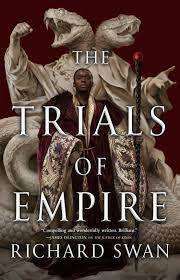 In the prologue at the start of The Trials of Empire (Book 3)—no real spoilers, calm down—we see a flashback of the early days of Vonvalt and Helena. A murderer is set to be executed, and Vonvalt is filling out forms; when Helena asks what the point is and why he wasn’t just killed immediately, Vonvalt explains why, without waiting for all the potentially mitigating facts, that wouldn’t be justice, noting:
In the prologue at the start of The Trials of Empire (Book 3)—no real spoilers, calm down—we see a flashback of the early days of Vonvalt and Helena. A murderer is set to be executed, and Vonvalt is filling out forms; when Helena asks what the point is and why he wasn’t just killed immediately, Vonvalt explains why, without waiting for all the potentially mitigating facts, that wouldn’t be justice, noting:
“Procedure seems tedious, and dry, and pointless. But it exists for a reason. Especially when we are dealing with life and death, it is all the more important.”
It’s a scene that could have been positioned at the start of Book 1, as a primer for why the law is important, why Vonvalt sticks to it, and why its precedence in Sova might, maybe, justify the immense bloodshed that preceded the Empire’s expansion (it’s also an argument that crops up again in The Scour). But, cleverly, Swan has put it here, a prologue to the final book in the trilogy. Immediately after, when we are thrown back into the events of Book 3, we see Vonvalt doing a lot of controversial things that seem to contradict everything we’ve just been told. And he’s challenged on it. In his response, he says, among other things:
“Sometimes we must act outside the bounds of the law to safeguard it. Claver [main antagonist] breaks the law to see that it remains broken. I break it only that it may be saved.”
Uh… what now? Seems like our hero has a case of the hypocrisies? Well, yes and no, and maybe both, and therein lies the rub of much of the trilogy. To make the case for and against Vonvalt, and the law itself, we need to understand two things here.
The first is deontological ethics versus consequentialism, a debate which ex-barrister Swan is clearly enamoured with as examples of it are dotted throughout this trilogy more frequently than hundreds and thousands in an ice cream factory. Simply and crudely put, consequentialism focuses on judging the moral worth of the results of actions only, whereas deontological ethics focuses on the moral worth of the actions themselves. Or even more simply and unhelpfully crudely, it’s okay to kill ten people to save a thousand… or alternatively it’s very much not okay.
Right then. So Vonvalt begins a deontologist and when things get dicey, suddenly he’s Captain Consequentialist? Not helpful. Anything else? Yes, there is, as Vonvalt helpfully clues us in a little later:
“I serve the natural law. Natural justice. If that means I have to operate outside the niceties of the common law, then so be it.”
Interesting… natural law is the idea that there are universal moral principles that form the basis of all just positive laws. Ingredients that the law takes from, but that still matter even regardless of the cake. The overall goal of both kinds of law? Justice. So when the common law can’t help him, Vonvalt is helping himself to a tasty slice of natural justice.
Does that make sense? Or is Vonvalt a desperate man in unimaginable circumstances trying to square a circle that can’t be squared, like an insane geometer? Maybe the answer lies in Vonvalt’s secret past. Because back in the second book, The Tyranny of Faith, we are privy to a brief conversation, barely remarked upon again, that completely changes everything we ever thought about the character, and suggests he’s not the upstanding paragon of justice we believed. Does that make him a hypocrite? Or does it mean that there are other moral principles we answer to as well? Good luck working that one out.
The Empire Strikes First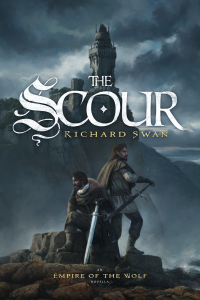 In The Scour, Vonvalt and his taskmaster Dubine visit the dying port town of Gdansburg on the edges of the conquered continental empire. The people here hate the Sovans, and it’s hard to say they’ve done much for them in this depressing windswept corner of the world. As one fellow justice (his rational voice and erstwhile lover Lady August) notes to Vonvalt:
In The Scour, Vonvalt and his taskmaster Dubine visit the dying port town of Gdansburg on the edges of the conquered continental empire. The people here hate the Sovans, and it’s hard to say they’ve done much for them in this depressing windswept corner of the world. As one fellow justice (his rational voice and erstwhile lover Lady August) notes to Vonvalt:
“These places, these people, they hate us. We are walking, breathing embodiments of the nation state. Of Sova. These people are our subjugates in every way that matters. We may as well have personally taken Gdansburg from them.”
Here we have the rub of all colonial questions, to paraphrase that famous Monty Python sketch: just what have the Sovans done for us? Well, there’s that legal system we just did a deep dive into. Is that worth it? Characters are constantly challenging Vonvalt throughout the trilogy to justify the Empire’s bloody conquest. Just like The British Empire and legions of empire before it, all conquering entities tell themselves that the bloodshed of conquering is worth it given the peace that follows. If a million people are killed in war but countless millions more are saved through peace and unity and medicine and law and reliable food supplies, is the Empire morally worthy? Again, that goes back to our old question of consequentialism versus deontology. Or as one character puts it to Vonvalt in Book 3, The Trials of Empire, as he tries to defend the bloody battles that preceded the Empire’s expansion:
“There is peace, and there is justice, and that is not the same thing. While the Empire has brought peace, where is the justice for those who died to bring it about?”
Ultimately this is a point Vonvalt never truly gets beyond, and as a man whose title is Justice, its carrion cry lingers long after the events of the trilogy have concluded.
And one more point while we’re on things empire: this is a trilogy not just concerned with whether empires can justify themselves, but how they collapse. In Book 2, when Vonvalt ventures to the capital to sound the alarm about the conspiracy to bring it down, we get a glimpse into the workings of how an empire is weakened from within. In the debating chamber, partisan operators flout convention and launch false attacks, while outside elite factions manipulate the system to sow division and bring the system down from within. Sound familiar? The Empire of the Wolf is partly about how complacent liberal systems whose old conventions are lapsing into irrelevance can be manipulated by extremist forces, and if you want to see parallels with modern day America, Britain, Europe etc, then they are there for you. Swan is smart enough not to make this explicit (he knows that the subtext is the strategy) but as every year goes by, the lessons of his work become more apparent. 2025 feels like the year when much of the West is collapsing in on itself, and if you want to understand why, you could do worse than read a bit of fantasy.
Dubine: The Man Every Man Needs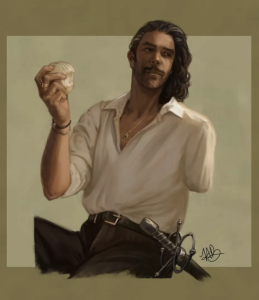 Insta: @hannahelizabetharts
Insta: @hannahelizabethartsThe Scour is, among many other things, a testament to the odd couple friendship of Vonvalt and Dubine Bressinger. Bressinger is Vonvalt’s taskman, his do-it-all handyman, and in the trilogy itself he provides an important counterweight to the, respectively, naive idealism and pompous arrogance of Helena and Vonvalt. A former soldier with a tragic past, Bressinger is loyal and strong, dour yet also frequently hilarious. As Helena notes at one point in Book 3,
“[Bressinger could be] surly and withdrawn, though his moods were often a foil to those around him. When Vonvalt was quiet, Bressinger would sing; when Vonvalt was dour, Bressinger was garrulous… Bressinger could be irrepressible.”
He also adds an intriguing argument to the debates about law I examined earlier. Dubine represents Vonvalt’s aggressive, soldier side distinct from his lawyerly studious side, and it takes Helena a good while to realise that Vonvalt is closer to Bressinger’s character than she ever realised. The two men’s friendship has been cemented by serious violent deeds in their past, the kind of friendship forged in fire that transcends many of Vonvalt’s erstwhile beliefs and, Swan suggests, transcends the values of the law, too. In many ways Dubine operates as a foil to Helena’s mistaken belief that Vonvalt was ever a paragon of anything, but given that she loves Dubine too, is that necessarily a bad thing?
The Horrors that Wait for Us AllLastly, no pretentious analysis of The Empire of the Wolf would be complete without a look at the horrors contained within. In Swan’s world there is an afterlife, in the loosest sense of the term, and contained within are utter horrors beyond the whit of man in the best tradition of eldritch and cosmic horror. In the first book The Justice of Kings, these horrors are more of an icing on the cake, a layer of extra necromantic spookiness of the kind often found in fantasy. Vonvalt can communicate with the dead, and he tells Helena of the strange entities there to whom humans are mere insects, and of the dark magics that come from the afterlife, the possession of which by various players in the Empire is a major plot point in the series. And in The Scour, the horror that appears there is almost more reminiscent of a Victorian ghost story, though readers of the series will notice some callbacks to the more complex horrors of the series.
But, in Book 2, The Tyranny of Faith, and even more so in Book 3 The Trials of Empire, Swan goes gonzo horror and dials the cosmic horror up to eleven, not so much This is Spinal Tap as this is my spine being ripped out by a demon tap-dancing on my soul. It feels a purposeful move, and as well as bringing an extra dimension (literally) to the plot, as the politics and physics and rules of the afterlife become just as meaningful as what’s happening in the current life, it allows Swan to examine some of the deep issues of cosmic horror, one of the key tenets of which is the idea that we cannot comprehend the realities of the dimensions beyond ours, and the figures that comprise it, and to do so would be to drive us mad. And indeed, time and time again when we encounter these places and figures in the trilogy, there is very little comprehension and the characters involved spend the aftermath in stunned silence, fighting madness.
Another key tenet is the idea that if the worlds beyond ours are not what we thought, how do we live our lives knowing this? Does it make us better or worse people, knowing we fight not for our place in heaven but simply for our actions on the ground? One character expresses her fear as follows:
“Do you know what my greatest fear is? That the afterlife is not some… bifurcated place where the good ascend to heaven and the evil descend to hell. But that it is just… random. A place of chaos, where the soul travels not for any reason, but for an absence of reason. A place where we go not as a reflection of who we were as people, but a place where we go as an end in itself. I should think nothing at all would be preferable. Can you imagine it?”
Swan makes his characters imagine it and, brutally but necessarily, leaves them to deal with it as best they may.
So there we have itThere’s plenty more that can be said about Swan’s Sovan-based works, and as he continues to plough intellectually terrifying, entertainingly intellectual and terrifyingly entertaining tales in successive connected trilogies there no doubt will be, but for now we can enjoy the return of the Emperor’s Justice in the Grimdark Magazine novella The Scour while being relieved that somewhere, sometime, is a very angry and probably correct Justice bellowing the law at someone so we don’t have to.
The post The Empire of the Wolf Revisited: The Swan Deep Dive appeared first on Grimdark Magazine.

 Read on Amazon
Read on Amazon

